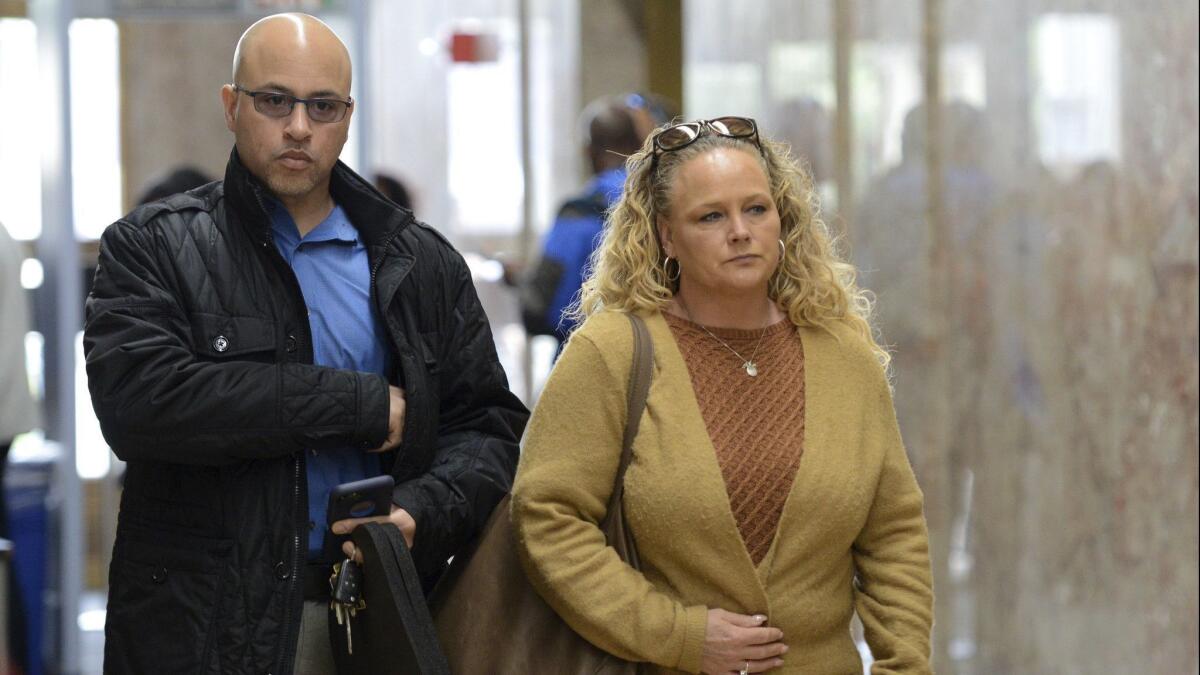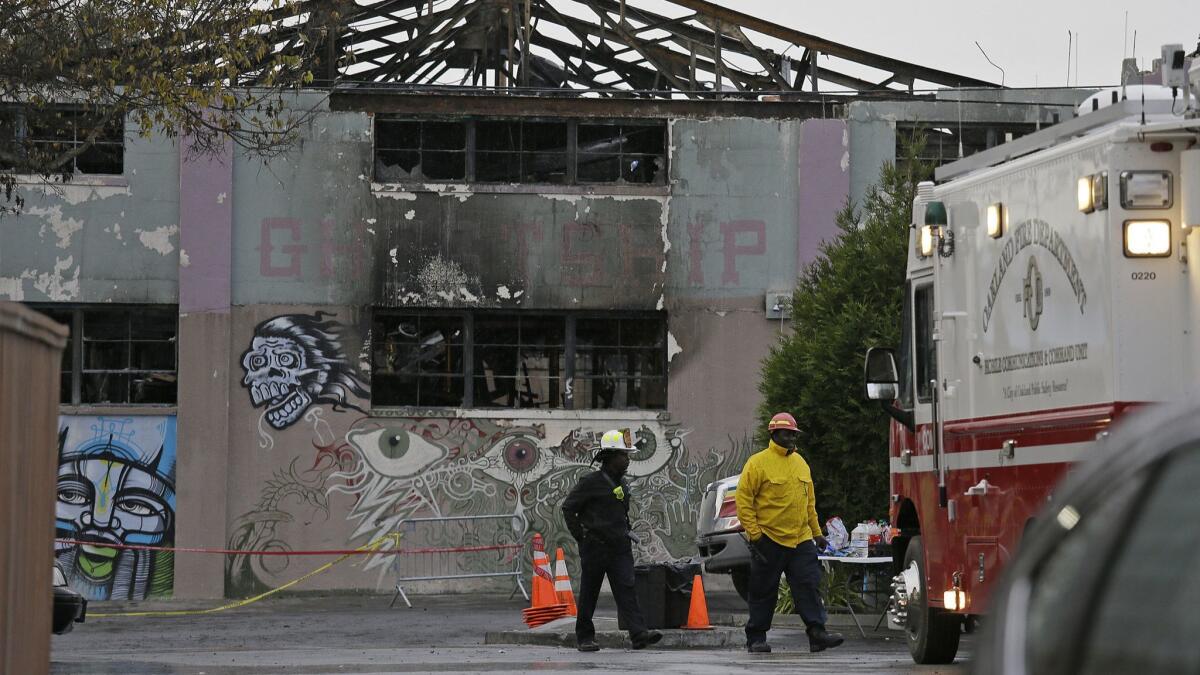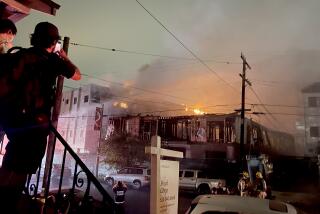Ghost Ship trial: A weary dad sits in court every day, missing his daughter

Reporting from Oakland — David Gregory comes every morning after working a graveyard shift as a diesel mechanic. He brings a cushion to soften the creaking wooden chairs where he’ll sit for hours.
On the fifth floor of the Oakland courthouse, he keeps vigil.
As testimony unfurls in the trial over the deadly Ghost Ship warehouse fire, he wears a silver necklace etched with his daughter’s name: Michela. It holds some of her ashes.
“I can just be at home and all of a sudden I cry thinking about something,” Gregory said. “I come to court — at least I’m learning what’s going on. I’ve been committed to coming to learn everything, as much as I can, about this case. I want answers.”
The long-awaited criminal trial has been underway since April, and a jury soon will decide whether two men are criminally liable for the December 2016 blaze that killed 36 people attending an electronic dance concert at the Ghost Ship, a warehouse that had been illegally converted into a communal artists’ residence and an underground event space.
Derick Ion Almena, 49, the property manager and leaseholder, and Max Harris, 29, the self-described “creative director” who helped collect rent and coordinated the concert the night of the fire, each have been charged with 36 counts of involuntary manslaughter.
Prosecutors say Almena and Harris knowingly created a tinderbox with inadequate means of escape. When the fire broke out, scores of people were trapped on the warehouse’s second floor, and those trying to escape the flames had to navigate a rickety, narrow wooden staircase. All of the victims, ages 17 to 61, died of smoke inhalation, authorities said.
For more than a month, testimony has focused largely on the conditions of the warehouse, the city’s building and fire codes and the grief of victims’ loved ones.
The Ghost Ship, a rabbit warren of artists’ living quarters that housed some two dozen people, was crammed with old pianos, tapestries, wooden pallets and motor homes parked on the ground floor, witnesses said. Fire investigators have testified that the 10,000-square-foot warehouse did not have smoke alarms, sprinklers or illuminated exit signs.
On the stand, some people testified that Almena laughed about safety concerns at the warehouse, which also was known as the Satya Yuga Collective. Rodney Griffin, a construction worker, said he once told Almena, then a close friend, that the building was a deathtrap. Almena, he said, joked that they should call it the “Satya Yuga Deathtrap.”
The prosecution rested its case last week, and the defense began calling witnesses Monday. Tony Serra, an attorney for Almena, said he expects at least three weeks of testimony and that his client will take the stand.
Fire investigators never officially determined the cause of the fire, and defense attorneys have suggested it was started by arsonists who may have thrown Molotov cocktails.
Serra told The Times that defense testimony will show that city inspectors “forsook their duties” and “looked the other way.” He said fire and police officials went inside, were aware people lived there and never issued citations. Serra said some even attended parties at the Ghost Ship.
He said the building’s owner, who was not criminally charged, deserves blame. So too, Serra said, does the city for failing to do something about the conditions in the warehouse.
“This is a political case,” Serra said. “The victims’ families are greatly aggrieved and in pain and suffering, and a jury has to decide it all.”
The case has become a crucible focused on soaring housing costs and the future of Oakland’s artists, many of whom reside in warehouses and other unconventional spaces. Serra said the case is about retribution.
But for Gregory, it’s really not about any of that.
“This is about our kids,” he said.
For weeks, family members of the dead have flocked to the stately René C. Davidson Courthouse on the edge of Lake Merritt, filling Alameda County Superior Court Judge Trina Thompson’s wood-paneled courtroom.
The day after the prosecution rested its case last week was dedicated to more procedural matters, and the courtroom was quiet, filled mostly with journalists. Gregory was the only family member there.
A potentially key witness for the defense took the stand in a hearing to determine whether her testimony would be admissible. There was no jury present.
Sharon Evans, 67, testified that she had left a church service Dec. 2, 2016, and was driving to a nearby taco truck when she noticed a fire in the back of the warehouse. She said she circled the block about 20 times, noticing the flames getting worse.
Evans finally stopped at the taco truck. She was getting ready to order, she said, when a group of 14 to 19 men in black hoodies approached. They were laughing and talked about having started the fire in the back of the building, she said.
“They kept saying that they were happy and satisfied about the fire burning,” Evans said. “They just kept talking about how nobody was gonna get out.”
Under questioning by Assistant Dist. Atty. Casey Bates, Evans acknowledged that she did not call the police. She said she left her contact information with investigators at the scene some two months after the blaze but was never contacted.
The judge let Evans testify before a jury Monday.
Gregory took notes in a small leather notebook. He didn’t believe her.
As he left the courthouse for lunch, several television news cameras waited near the exit. He usually avoids them, but he stopped.
“We want justice,” he told the reporters. “I want justice for my daughter Michela. And all the others want justice. It’s been torture.”
He walked away, frustrated, wishing he had been more eloquent.

Gregory has nightmares. They come during the day too, triggered, it seems, by almost anything.
“It could be a fire engine,” he said. “All of a sudden, it triggers this vision in my head of my daughter trying to escape the fire. Screaming. Burning. It’s something I don’t want to think about, but I can’t help it.”
Michela, 20, had gone to the concert that night with her boyfriend, 22-year-old Alex Vega. Authorities found their bodies in an embrace.
“She was — she was just a special little kid,” Gregory said, his voice trailing off.
His family was tightknit, he said. Summers were spent watching Michela play high school softball. She wore No. 32 because she idolized her older brother, a baseball player who wore No. 30. The number was taken on the softball team, so she became “30, too.”
Gregory worked the night shift, fixing buses for San Mateo County, for more than two decades so he would never have to miss his kids’ ballgames. That’s one regret he’s thankful he doesn’t have: He spent a lot of time with his kids.
At San Francisco State, Michela was majoring in communicative disorders with a minor in special education. She had grown close to a relative of Vega’s who had Down syndrome and wanted to work with children who had special needs.
Sometimes Gregory sees his wife crying.
The couple, he said, recently celebrated their 28th anniversary. They went to Niagara Falls. A cabdriver asked, “Do you guys have any children?” The pain flooded back.
Gregory has gotten used to watching Almena and Harris in court each day. He searches their faces for traces of regret.
Last fall, a judge tossed out plea deals for Almena and Harris, who agreed to spend nine and six years, respectively, in prison. Judge James Cramer said that Almena had not shown enough remorse and that the pleas were considered a package deal.
“If I could give you my children’s lives, I would,” Almena, who stayed with his family in a motel the night of the fire, told victims’ families in the courtroom. He offered to get the names of the dead tattooed on his body.
Gregory said that was one of the most horrifying things he’s heard. He lifted his shirt sleeve, revealing a tattoo of his daughter’s face on his left forearm.
“Please don’t get tattoos of our children,” he said, his eyes watering.

In the courtroom last week, Almena and Harris wore dark jackets, their long hair tied back in topknots.
In the audience was Danielle Silva, a 31-year-old tattoo artist with bright blue and green hair who has befriended Harris since his 2017 arrest. For weeks, she has stood outside the courthouse with a banner reading “FREE MAX.”
Silva said that artists are closely watching the case and that Harris is being blamed for a bigger problem: the city’s lack of regulations on building owners and landlords who refuse to keep their buildings up to code.
Silva said that she lives above a church office with three other people and that her landlords have refused to fix their flickering electricity for two years. She said that many people, like Harris, book underground events and that “this could have been any of us.”
“What’s riding on this case is our existence in our homes, our existence in our art spaces, our ability to book shows,” Silva said.
Colleen Dolan, whose 33-year-old daughter, Chelsea, died in the fire, told The Times in an email that “laws regarding building and fire codes are not written to thwart creativity.”
“They have been put in place to save lives. They must be enforced.”
Gregory has found strength in the other Ghost Ship families. He keeps them updated on the trial if they can’t make it.
Some days, he feels like he’ll drop from exhaustion. He’s put on 20 pounds. He’s got no time for the gym.
Each night, Gregory gets home from court about 5 p.m. and goes straight to bed. His night shift starts at 11 p.m., and he works until just after sunrise.
Then he goes back to court.
Twitter: @haileybranson
More to Read
Sign up for Essential California
The most important California stories and recommendations in your inbox every morning.
You may occasionally receive promotional content from the Los Angeles Times.











